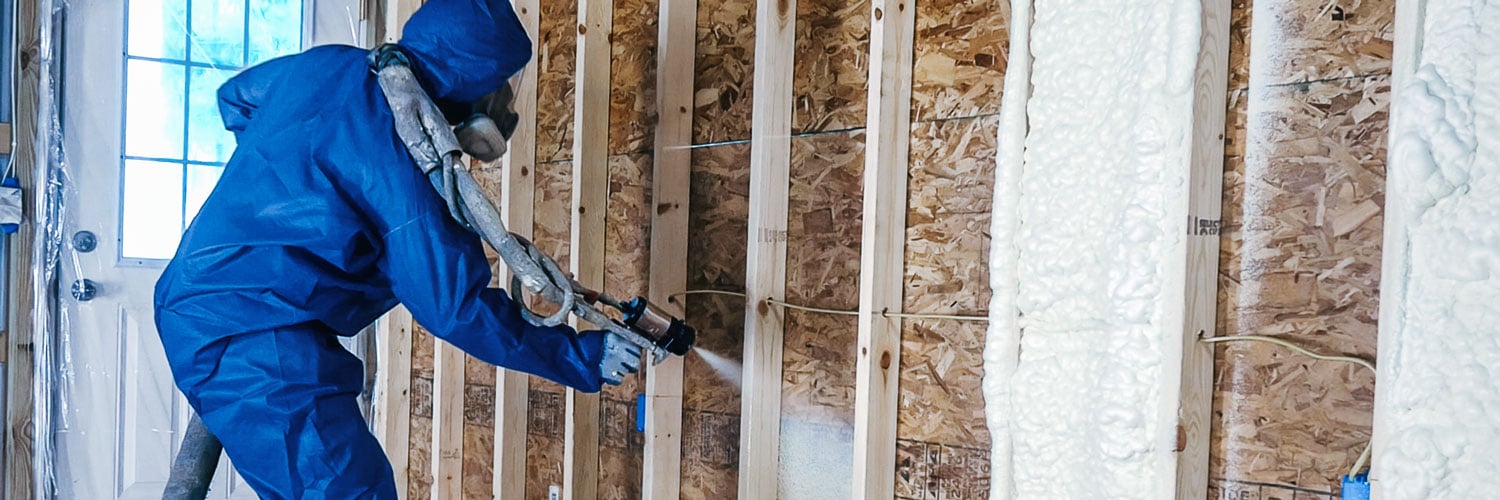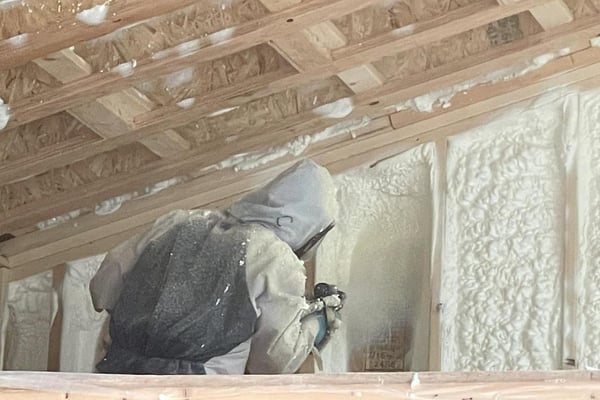Spray Foam: The Ultimate Option for Air Sealing and Insulation
Spray foam insulation has actually arised as a leading service for efficient air sealing and thermal insulation, supplying an unique mix of properties that set it in addition to standard techniques. Its capability to increase and fill voids makes it especially reliable in stopping air leak, which can considerably influence energy effectiveness. However, understanding the full range of its benefits, setup processes, and comparisons with various other insulation types is vital for making informed choices. As we discover these facets, the effects for both brand-new building and constructions and retrofits end up being increasingly substantial. What elements should affect your option?
What Is Spray Foam?
Spray foam is a functional insulation product that incorporates the concepts of air securing and thermal resistance to improve energy performance in buildings. Made up primarily of polyurethane or other comparable compounds, spray foam is applied as a fluid that broadens upon call with surface areas, developing a strong, continuous layer of insulation. This unique property permits it to load voids, fractures, and gaps that typical insulation materials may ignore, giving a premium air seal.
There are 2 primary kinds of spray foam: open-cell and closed-cell. Open-cell spray foam is lighter and much more versatile, providing outstanding audio absorption and a reduced R-value per inch - Spray Foam. On the other hand, closed-cell spray foam is denser, supplying a higher R-value, moisture resistance, and added architectural integrity to constructing elements
The application process normally includes specific tools, guaranteeing a smooth application that follows numerous substrates, including steel, wood, and concrete. This versatility makes spray foam appropriate for both brand-new constructions and retrofitting existing structures. Its capability to create an impermeable obstacle considerably adds to reducing power intake and boosting indoor air high quality, therefore making it a recommended option amongst builders and property owners alike.
Benefits of Spray Foam Insulation
Among the most significant benefits of spray foam insulation is its exceptional ability to develop a continual air barrier, which successfully minimizes energy loss. Unlike traditional insulation materials, spray foam expands to load voids and cracks, ensuring that air leak is considerably lowered. This particular not just boosts energy effectiveness yet also results in lower energy expenses gradually.
Additionally, spray foam insulation gives exceptional thermal resistance, adding to an extra steady indoor environment. Its high R-value per inch enables efficient insulation in confined spaces, making it suitable for attic rooms, wall surfaces, and crawl rooms. Furthermore, the moisture-resistant residential properties of spray foam aid protect against mold and mildew and mold growth, promoting healthier living conditions.
An additional vital advantage of spray foam insulation is its sound-dampening high qualities (Spray Foam). It successfully reduces noise transmission in between spaces, creating a quieter and more comfortable home setting. The resilience of spray foam likewise attracts attention, as it does not sag or settle with time, maintaining its efficiency throughout its life-span
Exactly How Spray Foam Works
Comprehending just how spray foam insulation functions is important for valuing its performance in air sealing and thermal resistance. Spray foam insulation contains two main elements: isocyanate and polyol resin. When these parts are mixed, they go through a chemical reaction that creates the product to broaden swiftly, producing a dense foam that fills splits, voids, and dental caries.
As the foam increases, it sticks to surfaces, creating a closed seal that considerably reduces air seepage. This particular makes spray foam insulation highly efficient at avoiding drafts and dampness infiltration, which can result in energy loss and damage in time. In addition, the closed-cell variation of spray foam offers exceptional thermal resistance as a result of its inflexible structure, properly lessening warm transfer.
The unique residential properties of spray foam permit it to adapt uneven surface areas, making certain thorough coverage and a smooth barrier. Because of this, spray foam insulation not only boosts power performance but additionally adds to improved indoor air high quality by reducing the build-up of blog contaminants and allergens. Ultimately, comprehending the auto mechanics behind spray foam emphasizes its function as a premium option for insulation and air securing in both property and industrial applications.
Setup Process Overview

Prior to installment, the area has to be adequately cleaned and prepped, ensuring that surface areas are devoid of particles, dampness, and dirt. Due to the fact that impurities can compromise bond and general performance, this action is critical. As soon as the area is prepared, the application involves blending both elements of the spray foam, which expands upon get in touch with and fills up gaps successfully.
Educated professionals should carry out the setup, making use of customized tools to make certain uniform coverage and ideal density. Safety preventative measures, including putting on safety gear and making sure proper ventilation, are vital during this process. After application, the foam normally remedies rapidly, developing a solid obstacle that improves power performance.
Contrasting Spray Foam to Typical Insulation
When examining insulation choices, spray foam insulation stands out in comparison to standard products such as fiberglass and cellulose. Unlike fiberglass and cellulose, which can enable air infiltration, spray foam expands upon application, loading holes and spaces to produce a closed seal.
In addition, spray foam provides a greater R-value per inch than typical insulation kinds, providing even more reliable thermal resistance in a thinner profile. This particular is particularly valuable precede with restricted cavity depth. Spray foam is resistant to dampness and mold growth, which can be a significant worry with cellulose and fiberglass, particularly in damp settings.
However, spray foam insulation usually lugs a higher ahead of time price than its traditional counterparts. House owners must evaluate this preliminary financial investment versus long-term energy cost savings and efficiency advantages. Ultimately, while both insulation types serve their function, spray foam becomes an advanced service for contemporary insulation demands, specifically in terms of air sealing and thermal effectiveness.

Conclusion
In summary, spray foam insulation stands for a very reliable remedy for attaining optimum air securing and thermal resistance. Its one-of-a-kind properties, including moisture resistance and audio dampening, make it ideal for numerous applications in both brand-new buildings and retrofitting jobs (Spray Foam). Although the preliminary expenses may be higher compared to traditional insulation products, the lasting advantages, such as substantial energy savings and improved interior air top quality, warrant the financial investment and highlight its value in modern structure techniques.
Spray foam insulation has emerged as a leading remedy for efficient air check over here sealing and thermal insulation, supplying an one-of-a-kind mix of buildings that set it apart from traditional techniques.Spray foam is a versatile insulation product that integrates the concepts of air sealing and thermal resistance to boost energy performance in buildings.When reviewing insulation choices, spray foam insulation stands out in comparison to typical materials such as fiberglass and cellulose. Inevitably, while both insulation kinds serve their objective, spray foam emerges as a more innovative service for modern-day insulation needs, specifically in terms of air sealing and thermal performance.
In summary, spray foam insulation stands for a highly efficient solution for accomplishing optimal air sealing and thermal resistance.